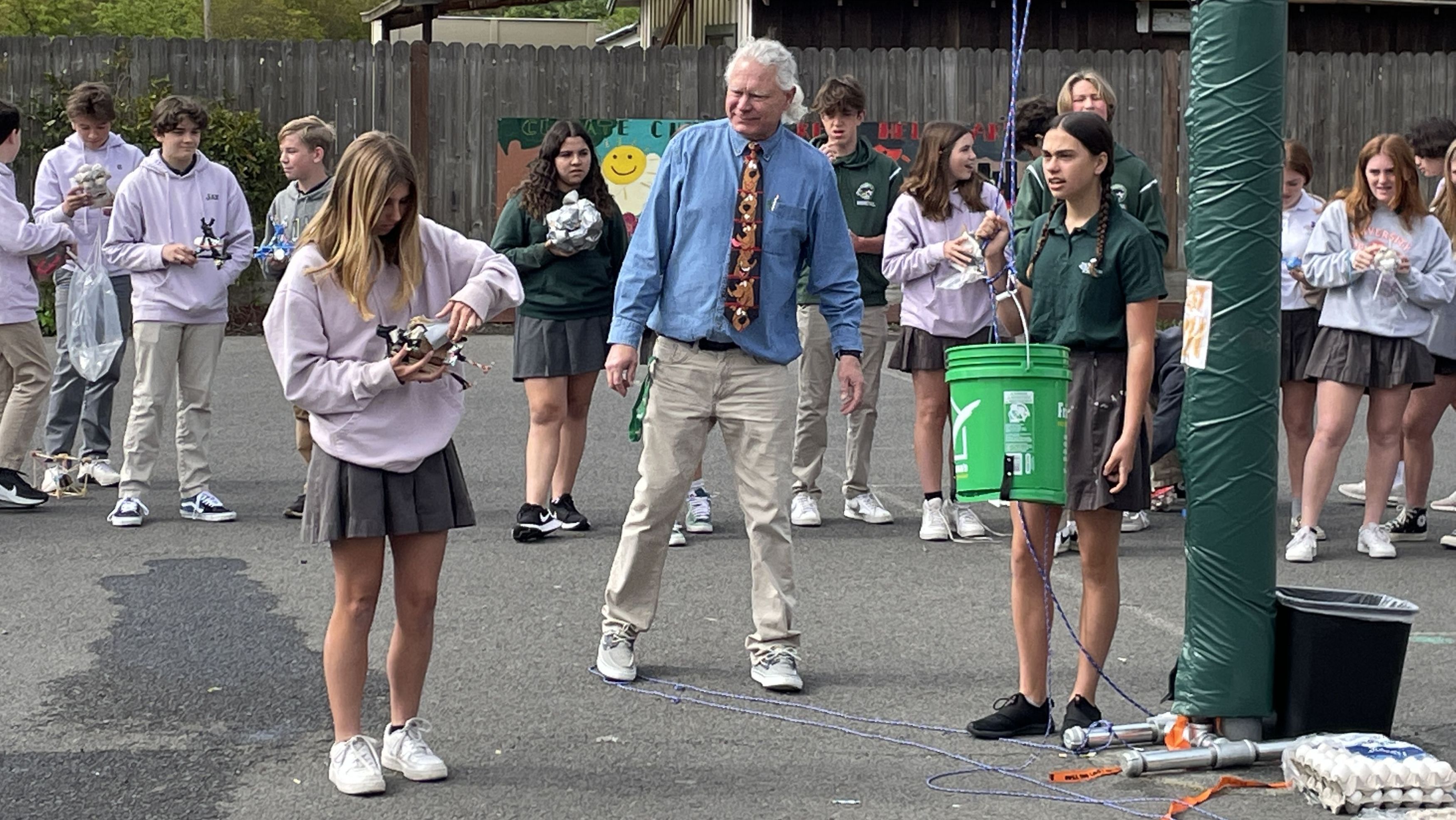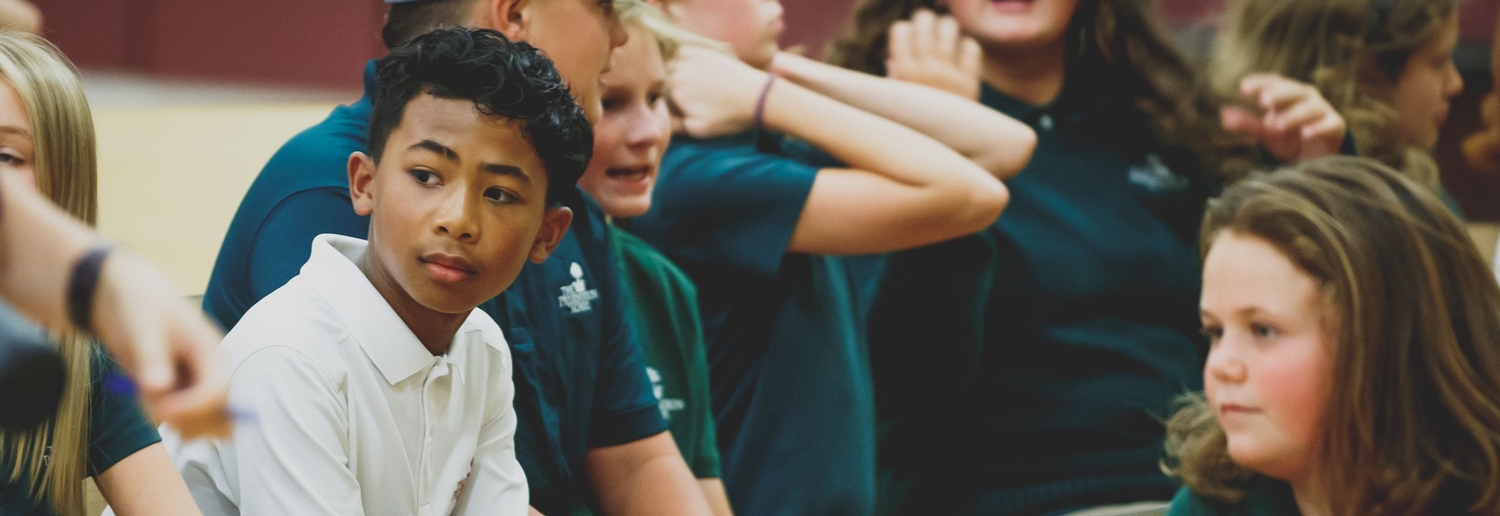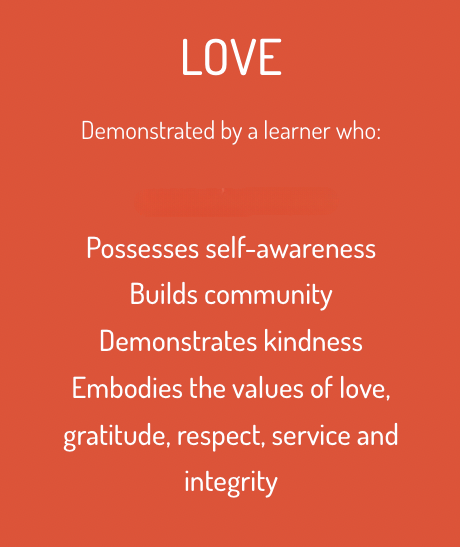
Overview
As students continue to grow and mature, our program and school grows alongside them. The words Love Learn Lead become more meaningful as students put thoughts and ideas into action across all curricular areas. As students enter the upper school years (grades 5-8), our teachers challenge them intellectually, support them emotionally, and treat them individually as they undertake more complex academic and personal pursuits, culminating in their capstone year-long 8th grade service project.
The Upper School schedule incorporates longer class periods to allow for in-depth study and project-based learning. In addition to longer periods, students spend also have split classes for more individual attention and engagement in the curriculum. Our interdisciplinary curriculum ensures students go beyond learning a single subject, fostering an understanding of how all disciplines are related.
Education at Presentation School extends beyond the classroom and boundaries of the school, as students partner with local and international organizations to help address complex local and global problems.
Language Arts
The middle school years at Presentation School offer the best of all worlds: an exciting, dynamic curriculum with engaged and engaging teachers. Language Arts blocks are blended with Social Studies, creating an integrated Humanities approach to learning.
Students learn, create, and explore different writing styles through the use of technology and 6+1 Writing Traits curriculum. Writing is taught as a process, building upon the basic skills developed in Lower School.
Presentation Upper School teachers have developed school-specific benchmark language arts skills, in which student progress is measured. Language Arts Benchmarks include following:
5TH GRADE
Narrator's point of view, character point of view, identify story impact, Information from printed sources, information from digital sources, technology to publish writing; metaphor, simile, verbs to convey time, states of condition verbs, multiple meaning words; report on a topic, sequence ideas, multimedia demonstrations of learning.
6TH GRADE
Determine theme, central idea, summary, personal opinion v. judgment; edit process, research with multiple sources, Introduction to the 5 paragraph essay, compare and contrast; pronouns, correlative conjunctions; collaborative communication and presentations.
7TH GRADE
Explicit and inferential analysis of text, citing evidence; analyze development of them, objective summaries, Identify character, setting, plot and how they interact; drama/poetry form and structure, form/structure effect on meaning, argumentative writing, valid reasoning, sufficient evidence, non formulaic introductions and conclusion, complex sentence structures, word position, context clues, Greek/Latin affixes and roots.
8TH GRADE
Theme development, theme related to characters, plot, setting, dialogue/incident impact, informative/explanatory text, writing organization, transitions, conclusions, conventions, active and passive verbs, personification, pun, hyperbole, analogy and irony, denotation and connotation, word choice, presentations based on evidence, issues, and ideas, critical review of information and purpose.
Mathematics
Presentation’s Upper School Math Program provides tailored instruction and small class sizes to ensure the most appropriate and meaningful math experience and sequencing for students. All courses cover foundational math concepts, as well as building skills in estimation, logic and problem solving. Placement in the appropriate course sequence is determined by past math performance, placement exams, teacher recommendation, and student interest.
In addition to their math course placement, all Middle School students participate in a week-long, integrated STEAM project in the second semester. This dedicated project week explores the connected disciplines of Science, Technology, Engineering, Art and Math, and challenges mixed-grade teams to plan, design and build a solution to a real-world challenge.
MATH 5 AND 6: FOUNDATIONS
All students take Math 5 and Math 6. These two, year-long courses reinforce students' knowledge of operations of whole numbers including addition, subtraction, multiplication and division, and then extend those skills to decimals, fractions, and mixed numbers. Students are introduced to integers, percent, perimeter and area, and basic equations.
MATH 7 AND PRE-ALGEBRA SEQUENCE
Algebra Readiness 7 and 8 is a two-course sequence that provides a deeper exploration of integers and rational numbers, numeric and algebraic expressions, and introduces methods to represent and solve multi-step equations and inequalities. Students are introduced to and deepen their understanding of percents, ratio and rates, area and volume, and probability and statistics. This sequence prepares students for Algebra 1 in freshman year.
PRE-ALGEBRA AND ALGEBRA 1 SEQUENCE
Pre-Algebra and Algebra 1 are a two-course sequence that begins in Pre-Algebra by building the key foundations and problem-solving skills needed for success in Algebra. The Algebra 1 course introduces and deepens students' understanding of equations and inequalities, functions, systems of equations, polynomials and factoring, radical expressions, and data analysis and probability. This sequence prepares students for Geometry or Algebra 2 in freshman year.
Science/STEAM
 Upper School students learn through a hands-on, real-world approach to exploring the scientific world in our well-equipped science lab. Through field experiences, labs, guest speakers, and an enriched curriculum, students are inspired to know more about all aspects of the natural world and the scientific underpinnings of human knowledge.
Upper School students learn through a hands-on, real-world approach to exploring the scientific world in our well-equipped science lab. Through field experiences, labs, guest speakers, and an enriched curriculum, students are inspired to know more about all aspects of the natural world and the scientific underpinnings of human knowledge.
6TH GRADE
In Earth Science students study the Solar System, Water Cycle and Earth's Weather. Students return with fresh eyes to the Chabot Science Center and experience the "Mission to Mars" simulation.
7TH GRADE
In Life Science Students study Plant and Animal Cells, Plant Structures and Functions, and learn the systems of the Human Body. The highlight in this unit is dissecting sheep hearts.
8TH GRADE
In Physical Science we study Types of Matter and Changes in Matter. In the spring we take an overnight field trip to Occidental to study the Redwood Forest Ecology and Coho Salmon.
STEAM
(Science, Technology, Engineering, Art, and Math) education is essential for our future economy as well as our kids' successful leadership in the world. STEAM-related occupations are, and will continue to be, the fastest growing and highest paid jobs in the U.S. For elementary and middle school students, early STEAM education reinforces critical thinking and problem solving skills that set the foundation for greater learning in high school and beyond. By teaching our students through STEAM, they understand why and how Science, Technology, Engineering, Art, and Math are tied together by classroom learning and through hands on experience.
Although STEAM is embedded throughout our curriculum, our middle school students all look forward to STEAM Week(s). During this time, regular classes press pause and students spend 5-10 days immersed in a mixed-grade team, working on a specific STEAM challenge.
Our first, 2015 STEAM challenge was a teacher-designed Mini Golf Hole Design project. In 2016, Presentation expanded our STEAM project and began a partnership with the San Jose Tech Museum and did a comprehensive study of earthquakes and engineering, culminating in the Presentation Great Shake Down. The 2017 STEAM challenge theme was Taking Flight. Science, Technology and Engineering were applied to help understand how and why and what makes planes and gliders soar through the air. The middle school students took a STEAM field trip to San Mateo’s Hiller Aviation where they participated in a Physical Science program to learn about flight before competing in teams to engineer, develop, and construct a soaring glider that could clear an obstacle and land on a designated landing pad.
Dr. Greg Garrison or “Doc G” is always innovating and creating new fascinating and hands-on project for our students. There's no telling what interesting projects Doc G will come up with this coming year!
Social Studies
Upper School History is part of the Presentation Middle School Humanities Block and is integrated with English. Although each grade has specific benchmark learning and themes that run throughout the year, the emphasis is on learning these topics in a meaningful context, reflecting on the impact of historical events on our modern world. Students learn how to study original documents, analyze for accuracy and bias, and compare and contrast them with modern events.
6TH GRADE
6th grade social studies focus on the different ways humans interact with their environments through work, art, recreation, and thought. A comparative study of ancient civilizations of Mesopotamia, Egypt, and China develop a frame of reference to understand and appreciate cultural differences and contributions. The Roman Empire is studied during the year, with an emphasis on how Greek and Roman government systems heavily influenced the establishment of the United States legal and governing structures. Students augment their studies with a trip to the Rosicrucian Museum in San Jose, to examine artifacts in the largest Egyptian museum west of the Mississippi.
7TH GRADE
7th grade students explore Medieval Europe and Asia, while exploring the feudal system, the rise of towns, the social codes of knights and royal courts, castles, the historical influence of the Roman Catholic Church, the Crusades, and the development of arts and sciences during the Middle Ages. Students explore world religions in faith, including the rise of Islamic Empires, and continue on to the Renaissance and Reformation.
8TH GRADE
Eighth grade Social Studies leaves the ancient past and turns to an exploration of our country’s origins. Students study the first expeditions of the United States, the pilgrimages that formed our nation, The French Indian War, the American Revolution, Civil War, and World War eras. The culminating experience for 8th grade students is the Washington DC trip, where they retrace the stories and steps of our Country’s remarkable history.
Values
Children and their families are unique in their personal values and beliefs. At Presentation, these values and traditions are honored, while simultaneously providing a shared foundation for the exploration or moral values and the social and emotional development of our students.
Presentation School’s Values curriculum seeks to do the following:
- Introduce school traditions while valuing diverse individual religious perspectives
- Encourage students to think outside themselves
- Provide meaningful service opportunities on campus as well as in our local and global communities which are reinforced through sound instruction and reflection in the classroom
- Encourage compassion and understanding and develop leadership
- Invite staff, parents, and community to active participation in the shared values of our school.
Students take part in planning and leading assemblies each month, reflecting on a universal moral value. Woven throughout these assemblies are service-learning opportunities. These monthly assemblies are celebrated and are built upon a character or moral value, challenging the community to apply that value to their personal lives.
Middle school students expand on these monthly themes and learn to appreciate the connections made both in our community and worldwide. Our Humanities model allows students to explore the connections and complexities of shared values and multiple religions informed by the arts, sciences, literature and history.
Sixth grade students complete study in values traditions within their study of ancient cultures, finding the correlations between faith traditions and recorded history. Seventh grade students are immersed in world religions as they study the fall of Rome through enlightenment, and study the ways cultural infusion and religious development influenced the rise, fall, and expansion of civilizations. Students in 8th grade complete their capstone community service project, while learning the importance values have played in their lives. Being a person with moral values, and the actions required of us, is explored in the context of understanding what is uniquely American and required of us as citizens.
Technology
Presentation School strives to teach and guide students on responsible technology use to ensure that wisdom grows along with skill.
Students live in an increasingly technology-saturated world, and being able to navigate an ever-changing digital terrain is a critical academic and personal skill. At Presentation, technology is integrated within the curriculum, creating an authentic learning environment, where students learn to use the appropriate tools to support their classwork.
Students in grades 3-8 experience our 1:1 Chromebook program. Presentation is a Google Apps for Education School, allowing students an integrated, real-world platform for research, writing, collaborating, presenting, calendaring, and student organization. With a shared technology platform, students will:
- Prepare for 21st-century integration of digital work and creative tools
- Engage in collaborative teaching and learning
- Access new learning materials and methods
- Create a global learning initiative
- Increase their engagement in the learning process, allowing teachers to adapt curricula to make learning more engaging and interactive
Will embody digital literacy and social responsibility
In addition to technology integration, Presentation School students learn keyboarding, and are offered technology electives that allow students to explore interactive programming, web design, video production, and introduction to robotics. Students are introduced to the foundational elements of computer science and reflect on ways that current and emerging technologies are shaping our world.
Learn how we've integrated and individualized technology at TPS here.


.png)
.png)